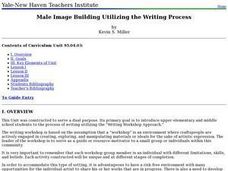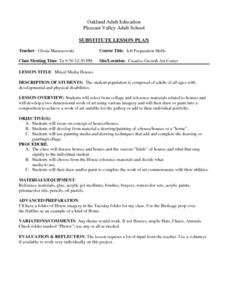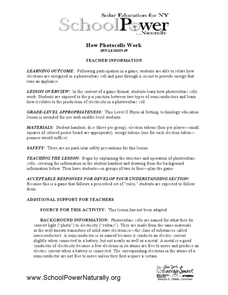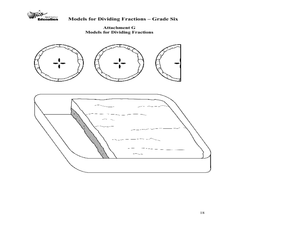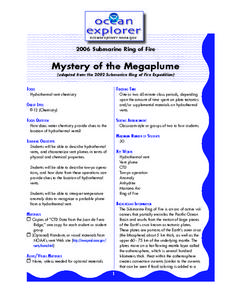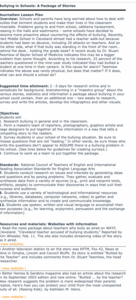Curated OER
Class of Gold
How can you see a number in nature? Here, learners discover both Fibonacci numbers and the golden ratio by exploring a number of different resources. Note: Some of the resources are older and may be missing some of the links, but...
Curated OER
Puberty, Day 1
Students watch a film about puberty, define key terms and compare and contrast male and female development. They discuss the purposes of brassieres, athletic supporters and mentrual hygiene products.
Curated OER
The Right Ratio of Rest: Proportional Reasoning
Students see how NASA scientists are studying the circadian timing system to improve astronaut's physical and mental tasks while working in space. They demonstrate how fractions, decimals, and percents are related.
Curated OER
Male Image Building Utilizing the Writing Process
Introduce your class to the techniques of proper writing. In groups, they brainstorm their ideas on family structures and discuss the importance of having a male figure in their lives. After listening to an African-American poem, they...
Curated OER
Mixed Media Houses
Students select from collage and reference materials related to houses and develop a two dimensional work of art using various imagery and then draw or paint into a composition to achieve a work of art suitable for the gallery or add to...
Curated OER
Biggest Trees in the United States
Learners use the Internet (or printed sources) to locate information. They fill in missing information on a graphic organizer (chart) and use the data to answer questions. The research skills help students to develop higher order...
Curated OER
Healthy Heart Night
The idea of having a Healthy Heart Night at your school is a fabulous thought. Here are a few ideas that detail was done at one elementary school. It would take a lot of organizing to make it happen, but seems well worth the effort. This...
Curated OER
How Photocells Work
Give small groups of physical scientists tokens that represent electrons in a photovoltaic cell. They play a dice game in which they move the tokens around, representing the flow of electrons through the p-n junction of a semiconductor...
Curated OER
Overland Trails To The West
Consider the political, physical, and geographical factors that led to and marked the Westward Expansion. Learners will track the various routes developed during the 1800's. They create a first person journal describing what they see,...
Curated OER
Protecting the Mummified Troll
Students develop an invisible security system to protect a mummified troll. In this security system lesson students view a portion of Mythbusters and begin their challenge.
Ohio Department of Education
Models for Dividing Fractions - Grade Six
Fifth and sixth graders use food and candy to help them represent division of fractions and develop algorithms to solve fraction problems. They discuss dividing whole numbers by fractions. Pupils use sticks and chocolate bars to...
Curated OER
Dr. Heidegger's Experiment
Examine the idea of perpetual youth and immortality while you read Nathaniel Hawthorne's Dr. Heidegger's Experiment. Some links work to direct your learners to information about the Fountain of Youth. Using this information, scholars...
Curated OER
Mystery of the Megaplume
Read through the extensive background information and then lead your geology or physical oceanography class through an investigation of actual temperature anomaly data from the Juan de Fuca ridge. They translate the data onto a plot,...
Curated OER
Centripetal Force
In order to investigate cetntripetal force and angular momentum, youngsters compare the motion of erasers hung from a string. It is not clear what type of Amish toy is needed in the warm up activity, so you may not be able to use it. The...
K12 Reader
Hide and Seek
Why do certain animals look the way they do? It could be because they have developed camouflage. Kids can read up on camouflage and mimicry and then respond to five questions related to the content of the passage.
Curated OER
Where is Everybody?
Students collect data from different grade levels at their school and develop thematic maps which show population density, and determine how this might affect the school and themselves in the future.
Curated OER
Art Careers: Interior Decorator
Pupils redesign specific areas of their school using interior design techniques, magazine ideas, and cooperative learning groups in this middle and high school level instructional activity. Emphasis is on examining the career...
Curated OER
Bullying in Schools: A Package of Stories
Students conduct research on issues and interests by generating ideas and questions and by posing problems and gather, evaluate and synthesize data from a variety of sources to communicate their discoveries in ways that suit their...
Curated OER
Where Are You?: Prepositions of Place
Examine prepositions of place in this language arts lesson. Learners participate in activities to indicate prepositions and physical actions that demonstrate those prepositions. They create drawings with shapes, play the games "Simon...
Curated OER
The Sun Sets Everywhere
Eighth graders identify and explain the connections between new ideas and information and their previous beliefs, values, and experiences. They understand that certain themes are relevant to their lives. They realize the harm of clicks...
Curated OER
Water and Ice
Young scholars explore water and ice. In this physical science lesson, students participate in a science inquiry and observe the characteristics of ice and water. Young scholars compare the differences between a solid and liquid and...
Curated OER
HABITAT for the other 90%
Learners examine the connection between the habitat needs of endemic species to the habitat needs of humans. In this habitat lesson students research the habitat requirements of a given family then develop an idea to improve the...
Curated OER
Society - Timeline
Pupils look at a timeline of the development of different disabilities and discuss how different they all are. In this disabilities lesson plan, students then fill out a worksheet of examples of different kinds of disabilities.
Bright Hub Education
Introducing "Number the Stars"
Prepare your class to read Number the Stars, by Lois Lowry, with these prereading activities. This resource lists three ideas to ready your readers. Learners explore the historical context, connect to the book, and preview the book....
Other popular searches
- Infant Physical Development
- Infancy Physical Development
- Adult Physical Development
- Physical Development Children
- Varied Physical Development



